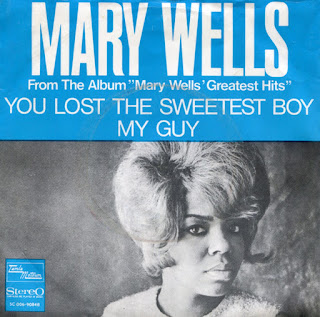MARY WELLS - MY GUY / THE TEMPTATIONS - MY GIRL
MARY WELLS -MY GUY
Released : March 13, 1964
Charted: UK: #5 US: #1 (2 weeks)
"My Guy" is a 1964 hit single by American singer Mary Wells, written and produced by Smokey Robinson. The song is a woman's rejection of a sexual advance and affirmation of her fidelity to her boyfriend, who is her ideal and with whom she is happy, despite her ordinary physique and looks. This is a celebration of a strong and loyal love. It stresses the singer's unwavering commitment to her guy and the belief that no one else can replace him in her heart. It serves as a testimony to the power of a deep emotional connection and the ability to find happiness in a genuine relationship. Robinson wrote a song similar to "My Guy" from a male perspective that was a huge hit for The Temptations: “My Girl”.
Mary Wells' smash hit "My Guy" was her last solo recording for Motown. She became recognized as "The Queen of Motown" until her departure from the company in 1965, at the height of her success. The first female star for the record label, she also became the first to dare to leave when 20th Century Fox wooed her with a $200,000 advance and potential movie roles. She officially left in 1965. Motown mogul Berry Gordy allegedly coerced radio stations into keeping Wells' new records off the airwaves, but she still scored a hit with "Ain't That the Truth" and "Use Your Head." Nevertheless, her relationship contract with 20th Century Fox dissolved the following year. She bounced from label to label and eventually retired from music in 1974 to raise her family.
This was the song that broke up The Beatles famous monopoly on the Top 5 US chart positions in May of 1964. Mary Wells receive a recognition after her death when "My Guy" was inducted into the Grammy Hall of Fame in 1999.
THE TEMPTATIONS - MY GIRL
Released : December 21, 1964
Charted: UK: #2 US: #1 (1 week)
"My Girl" is a song recorded by the Temptations written and produced by the Miracles members Smokey Robinson and Ronald White. It became the Temptations' first U.S. number 1 single, and is currently their signature song. Robinson's inspiration for writing "My Girl" was his wife, Miracles member Claudette Rogers Robinson. The song was included on the Temptations 1965 album The Temptations Sing Smokey. In 2017, the song was selected for preservation in the National Recording Registry by the Library of Congress as being culturally, historically, or artistically significant.
This song was written in the Apollo Theater when The Temptations were playing as part of a package tour with The Miracles. According to Robinson, he was working out the song on a piano at the theater when his bandmate Ronald White joined him and they hashed out the song. When The Temptations heard it, they convinced Robinson to let them record it instead of The Miracles. Robinson, who was Berry Gordy's right-hand man at Motown agreed, and rehearsed the song with The Tempts over the next week. When they returned to Detroit, Robinson and White produced the session when they recorded this song.
Robinson explained that he wrote this with David Ruffin's voice in mind. It was the first Temptations single to feature Ruffin on lead vocals (Eddie Kendricks and Paul Williams sang lead on previous Temptations singles), and it led to a greater role for Ruffin, as he became their primary lead singer. Robinson went on to write many more hits for The Temptations, who were considered the most talented vocal group at Motown.
Members of the Motown house band The Funk Brothers played on the track. The song has a very simple but effective arrangement, which was charted by Paul Riser. It opens with James Jamerson's bassline, then goes into the ascending guitar figure played by Robert White (not to be confused with the song's co-writer/producer, Ronald White). Finger snaps come in, then drums played by Benny Benjamin and strings provided by the Detroit Symphony Orchestra. The arrangement accentuates the vocals, making the words very easy to understand. This served as a template for future Temptations recordings and helped make them stars, as attention was always focused on stage on the singers.
The song was re-released in 1992, following the November 1991 release of the film of the same name, which featured the song. It did not reach the Billboard charts, but did reach number 2 in the UK Singles Chart.
















Cap comentari:
Publica un comentari a l'entrada